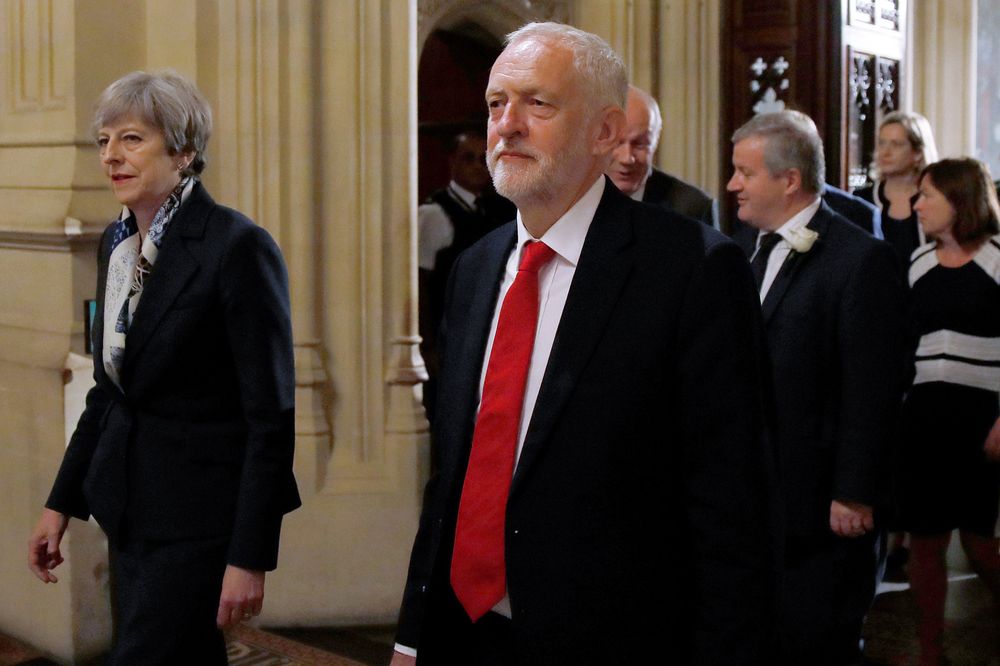Analysis
The idea of a May-Corbyn Brexit angered some Tories and leaves Labour exposed
May’s move to consult the opposition is a desperate attempt at applying common sense to her situation. Corbyn knows this compromise means he will have to abandon the studiously cultivated ambiguity in which he had managed to position himself.

Are we headed for a “grand coalition” Brexit? Theresa May has invited Jeremy Corbyn to the negotiating table in order to try to rescue the project of exiting the EU from the stalemate in which it has been mired for months.
After she announced on Monday night that she would extend this olive branch, while casually waving off the damage from the latest two blows against her Brexit deal—namely, the two newest defections from her cabinet, joining a list so long that it has become nearly impossible to keep count—May has met with Corbyn, the Welsh First Minister Mark Drakeford and the Scottish Prime Minister Nicola Sturgeon. Tuesday night’s talks ended with no significant progress made—although the Labour side described the meeting as “constructive” (or, in Corbyn’s own words, “useful, but inconclusive”).
The negotiations continued on Thursday, although the participants have been cautious not to claim that significant progress has been achieved. As of Thursday evening, the latest development was May’s intention to make an offer to the Labour side in writing, staking out a position which would apparently include—at Labour’s insistence—giving Parliament the option of approving a second referendum on the Brexit deal that is eventually passed. The negotiations are set to resume on Friday.
In any case, the talks have certainly accomplished something they were always likely to do: they roused the anger of the Tory right.
Until now, the Prime Minister had bet everything on appeasing the Eurosceptic wing of the Conservatives, perhaps conveniently forgetting the fact that they were impossible to satisfy, would never be happy with her Brexit deal and would keep raising ransom-like demands (as David Cameron knows all too well). But the rift between them and the moderate pro-European wing of her party, aggravated by the decisive importance of the ultra-conservative Northern Irish DUP party for the government’s majority, ended up blocking off every path to May’s deal ever being passed.
The idea behind the talks is still to find a common position, not on the withdrawal agreement itself—the 585-page document that includes the Northern Irish backstop, and which the EU has repeatedly insisted that it was unwilling renegotiate—but on changes to the political declaration, the part of the agreement that outlines the nature of the future trade relationship between the two parties after the UK’s exit, and which has no binding legal force on the EU.
May’s plan seems to be to try to get a modified political declaration approved by the House of Commons—which has rejected every option laid before it so far—by April 10, when the EU will have a summit to discuss Brexit. She would thus be able to present this modified version to the EU, while getting them to approve another extension to the Brexit deadline until May 22, in order to avoid both having to participate in the European elections and a disastrous no-deal Brexit on April 12.
Thus, May’s move to consult the opposition is nothing more than a rather pedestrian (and desperate) attempt at applying common sense to her situation, rather than a sign of a radical about-face in her political orientation. Predictably, May’s own party, which is little more than a cabal of past-their-prime businessmen terrified by the prospect of a Corbyn government, has reacted badly to her newest plan, with countless recriminations converging around the theme of a “ruined Brexit.”
For once, May has actually done what she said she would do in her speeches before Parliament, although there’s nothing particularly impressive about it: with her back against the wall, she has finally decided to open a dialogue with the opposition in the interest of the whole nation, no longer in the exclusive interest of preserving the unity of the Conservative Party.
Corbyn said he was pleased by the invitation, although he knows this compromise means he will have to step out of his comfort zone, namely the studiously cultivated ambiguity in which he had managed to position himself, particularly on the question of a possible second referendum—a plan towards which Labour’s parliamentary group, taken over by the centrists, wants to push him at all costs. Becoming a part of the process is a risky step for Corbyn, potentially tying his party to a deal that nobody wants—not to mention that the possibility of the UK taking part in the European elections, for which the country has already prepared contingency plans, would likely galvanize Euroscepticism and risk sending a large contingent of ebullient nationalist-sovereignists to Brussels, headed by Nigel Farage himself.
While they don’t openly attack each other as viciously as the Tories do, Labour MPs are obviously just as divided on the question of Brexit, as the issue ties in to the struggle of the moderates against Corbyn’s leadership. Corbyn himself, in order to get even a little respite from the ceaseless criticism by the centrists (and also by the trade unions that support him), agreed to include in the party’s manifesto for the 2017 elections a Brexit plan that included remaining in the single market and customs union—while, at the same time, he stayed broadly in line with the government’s position on the end of free movement, as well as on the impossibility of implementing nationalizations. It was an act of justifiable political realism, although one of debatable usefulness.
Meanwhile, the anxiety of both big business and the trade unions at the prospect of a no-deal Brexit has reached such a fever pitch that a few days ago, the CBI British industry confederation and the TUC trade union put out a joint statement in which the former class enemies spoke with one voice regarding the national emergency of a no-deal outcome.
Originally published at https://ilmanifesto.it/may-corbyn-colloqui-utili-ma-inconcludenti-destra-tory-inferocita/ on 2019-04-04
